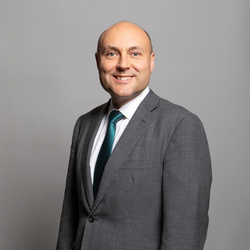Amid the turbulence of Covid-19 and the growing impact of climate change across the world, what practical steps can a small business take to cut carbon emissions, reduce its impact on the environment and move towards net zero?
This question was the core focus of Race to Net Zero: Ways Your Business Can Help and Prosper, an online conference organised by the Coastal West Sussex Partnership and Platf9rm last week.
The event brought together Sussex business leaders to hear from a panel of leading voices on the topic, to ask questions and reach out for support.
The Partnership’s Vice Chairman James Dempster, Managing Director at Brighton marketing agency Fox & Bear, kicked things off by introducing the event speakers and reminding everyone that the conference was just the start of a broader conversation with local authorities and policy makers, with more events planned for after COP26 and into the new year.

Andrew Griffith, MP for Arundel and South Downs, UK’s Net Zero Business Champion
First up, the conference heard from the UK’s Net Zero Business Champion Andrew Griffith, MP for Arundel and South Downs, on the national context for the discussion. With COP26 just a week away, and recent announcements from the government on plans for a green industrial revolution, Andrew said there is no better time to be engaging with businesses on the need to decarbonise and providing the right support as the UK moves through a huge period of transition. He described this journey to a clean, green economy as an “incredibly important and exciting moment” and compared it to the digital revolution.
Andrew added that while government must set high level ambitions, these plans must translate to real on-the-ground activity, within a climate where new technologies can be developed and whole new industries can be created, with business at the heart of problem-solving. Andrew emphasised that West Sussex can play a key role in a green revolution, with opportunities for clean energy, a new hydrogen economy and regenerative agriculture and rewilding.
Sam Zindel, Managing Director, Propellernet
So, what is the business case for achieving net zero emissions? Sam Zindel, Managing Director of Brighton digital marketing agency Propellernet, explained the four reasons that business action on climate change is imperative:
- To drive growth: we’re in the middle of a major transformation and there’s a huge growth opportunity to capitalise on.
- Long term cost: thinking ahead is going to reduce the long-term liability for businesses in the face of climate change.
- Risk: The World Economic Forum has posted their 16th annual global risk assessment and for the first time, the top five risks to the economy were all related to environment and climate issues. Every business is at risk, not just from the physical impact of climate change, but volatilities in supply chains too.
- Trust: consumers and businesses are looking for leadership on climate. The brands and companies that are able to act, set pledges and deliver on them will ultimately be the trusted brands for the future that will power the low carbon economy.
Sam added that for businesses feeling overwhelmed by the net zero challenge without a clue where to begin, the UK’s SME Business Climate Hub has useful resources which are sector specific, as well as Small 99, which has guidance and practical steps for small business owners to cut emissions.
Zoe Osmond, Director at Clean Growth UK
The conference also heard from Zoe Osmond, Director at Clean Growth UK, a pioneering network that supports businesses with green innovation. Clean Growth UK is launching a new carbon accounting programme at the end of the year, which will allow SMEs to calculate their carbon footprint and provide support with carbon reduction. Zoe appealed to businesses to get in touch – as help is there for those who need it.
In addition, the Low Carbon Across the South and East (LoCASE) programme, backed by West Sussex County Council, offers grants up to £10,000 for businesses installing energy efficiency measures such as LED lighting, insulation, heating or machinery upgrades, or renewable energy systems.
Steve Read, Director of Environment and Public Protection, West Sussex County Council
Steve spoke about the challenges facing councils in decarbonising the built environment, and said projects are underway to design in more sustainable ways. This includes the Local Energy Community near Crawley, where the council is looking at more creative ways to make use of surplus energy. Steve emphasised the importance for local authorities to feed back to businesses on successful sustainability schemes and encouraged companies to explore funding opportunities through the LoCASE programme.
Q&A
Questions were raised about which sectors could be most affected by climate change – but all speakers agreed there is no sector which won’t be impacted, as everything is based on energy.
Some businesses will find it easier to get to net zero quicker than others – particularly SMEs in the service industries. Speakers agreed that while it’s important to seek out support, you don’t have to be a scientist to recognise certain immediate changes which could have a big impact – such as seeking out more local suppliers, where possible.
For Sam Zindel, his business has benefitted from being able to show evidence of lowering emissions in successfully pitching for work – as a provider of services to a larger company, his business’ carbon emissions are also part of their footprint.
Andrew Griffith highlighted that attracting new recruits and employee engagement are also important factors, as there is a new generation of talent who are looking at work through the lens of how they can make a difference in the world.
In summary…
The conference ended with some simple steps from each speaker that businesses can take as an initial starting point to tackle emissions:
- Andrew Griffith MP: Turn off lights, computers and all electrical equipment at night, and look at how you can improve your supply chain.
- Zoe Osmond: Reach out for help and make use of the resources available – from the UK Business Climate Hub to Clean Growth UK.
- Steve Read: 40 per cent of waste in Sussex is food – plan ahead and make a shopping list!
- Sam Zindel: Engage your team with whatever you’re doing on net zero, and also think about finance. Look at the pension plan your company supports – where that is money going? It’s often a hidden emission businesses are unaware of.
This conference is just the start of the conversation. On Wednesday 08 December, there will be another facilitated session for businesses to give feedback to local authority leaders on barriers they face in reaching net zero, with the aim to to strengthen support networks, and further sessions are planned for the new year.
Please check our events page and social media channels for further updates.
